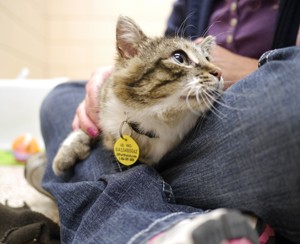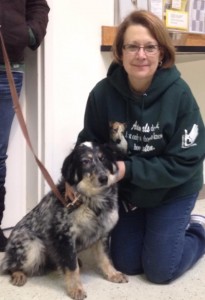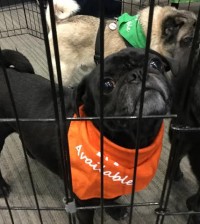- Do you subscribe to Dharma Dog Training’s Newsletter? You should.
- A Unique Campaign from The Humane Society of the United States
- Rabid bats in Omaha- Stay safe, prepared with these tips
- Springtime Activities in Omaha
- Mill Dog Monthly from Bailing Out Benji
- World Spay Day, Legislative Alert in Nebraska
- Attend the Nebraska Rescue Council’s monthly meeting this Saturday
- Five Hard-to-Ignore Reasons to Adopt!
- Paws in Pink to Benefit Breast Cancer Foundation
- VCA, Inc. Acquires MidWest Vet Specialists from Kansas State University
Project Pet Safe- caring for victims of domestic abuse

Continuing our coverage of animal rights week, we’re proud to bring you information about Project Pet Safe- a vital service provided by the Nebraska Humane Society.
We recently brought readers news of a Virginia law that seeks to protect animals from homes where domestic abuse occurs (you can find it here) and an overview of other national news related to animal welfare and protection in another feature article. Now, we are pleased to share some information about efforts being made in Omaha that aid victims (both two-and-four-legged) in escaping violence at home.
Over a decade ago, a need was recognized by the Nebraska Humane Society. When domestic abuse happened, husbands and wives, fathers, mothers and children were separated, cared for and readjusted their lives accordingly. Animals, however, were often the forgotten parties and were left in limbo. When things settled down, when mom or dad and the kids found a new, safer place to live, what was to become of the family pet? The NHS sought to nip those questions and issues in the bud.
“The project started on a wing and prayer,” says Pam Wiese, Vice President of Marketing and Advertising and the shelter. “It was a temporary fix to start- we boarded animals until things at home were settled, then returned pets if they were going to be safe. We had to adjust, revamp the program later to meet needs.”
Denise Gurss is the Director of Shelter Training and Behavior at the Nebraska Humane Society and Project Pet Safe falls under the umbrella of her department. She has managed the program for 12 years by working with people, pets and charities in the area. If a domestic abuse victim has a case worker stemming from a domestic abuse occurrence, their pets can stay with the Nebraska Humane Society. Victims are referred to the NHS by case workers from Women’s Charities, homeless shelters, churches, Catholic Charities and other organizations in the area.
“We allow victims to safely remove themselves and their animals when they feel threatened,” Gurss says. If a person is displaced because of domestic violence, has a case worker and has an animal, Gurss is able to offer up the shelter’s services.
As an example of the process, here’s a typical situation that Gurss and the NHS is presented with:
A person is the victim of a violent household and has left that home. Because they have nowhere else to go, he or (more likely) she often winds up at an area homeless shelter or charity. A case worker who is in contact with the victim takes on the domestic abuse by representing the victim and advocating for their children and pets. While the victim is looking for housing, pets need a place to stay. Bylaws and a grant dictate how much Gurss and the NHS can help. Typically, the NHS will board animals of victims for two weeks before any further action is taken. Pets are checked over by veterinarians on staff and given a safe haven while their owners find a better situation. Case workers and folks like Gurss from the NHS advise victims and counsel them with everything that needs to be addressed. While victims are getting back on their feet, pets are not a worry.
Gurss stays in contact with victims and case workers throughout the process, making efforts to prevent this kind of situation from happening again. She counsels victims often about what is best for them and their animals. She doesn’t want parents doing any disservice to their kids or animals, so she advises them in the best way she can. There are rare cases where Gurss will have someone who comes back two or three times with pets and she has to intervene. “We have to determine what is best for people and the animals.”
Recently, Gurss was presented with a case where a battered woman was displaced from her home. She had a case worker, so Gurss was able to get the victim’s two cats who were previously adopted from the NHS into Project Pet Safe. After two weeks or so, and the necessary treatment was given to mom and her cats, there still wasn’t a solution to the future living situation. Often, it is hard for pet owners to bring animals with them to their new homes (apartments, shelters, etc.). One of the victim’s cats was fairly young; another was much older and was discovered to have a large, cancerous mass that needed to be surgically removed. After counseling and consideration of the victim and the animals, it was decided that Project Pet Safe would take the cats in through a consensual surrender.
The younger kitty was cared for, boarded and eventually adopted out. The elder, given her age and condition, was placed in hospice care at the shelter. With the use of an office at the shelter, the NHS is able to provide the victim’s cat with a comfortable, warm and safe place to spend its final days.
“When the time comes, I will let the owner know,” Gurss says. “She’ll be able to come down to the shelter, see her cat and say her goodbyes.”
This may not seem like the best way for a cat and owner to spend their last days together, but consider this alternative: Project Pet Safe was started out of need over a decade ago, and mostly because of numbers like the ones we presented in our previous article about animals from homes where domestic abuse occurs. When there is, for example, a battered woman leaving her violent household and leaving her dog, guess who gets abused next? The NHS and Project Pet Safe doesn’t let animals suffer while relationships are in flux, people are in danger and abuse is occurring. The service is necessary, valuable to victims of abuse and utilized because of that “something” that compels us about animals. We always consider them, we call them family. We don’t want them abused, so we start programs like this- wonderful programs like this.
Pam Wiese has estimated that Project Pet Safe handles 40-50 cases per year. Gurss served 9 cats in 2013. Seven were returned and the other two are included in the aforementioned example. Meanwhile, 11 dogs were taken in last year; all were returned to their owners. Under the circumstances of domestic abuse, the shelter does its best to assure the safety of animals and hope victims of violence find better places in their lives, but things aren’t always rosy.
“We’d love it if we were in a position where we weren’t in business,” Gurss says. “We like having the opportunity to help people, though.” Gurss says her job is often bittersweet, but she sometimes gets “Thank You” cards or follow-ups from people and pets she’s helped. “That’s the most rewarding part of my job- seeing people and pets come out of these situations and being thankful.”
In talking with Gurss about the program, mission and nature of Project Pet Safe, Gurss mused that the Nebraska Humane Society has “sort of come full circle with this program.” When the NHS was first established, they took in not only animals, but orphans. That is; they helped pets directly, but also people.
“There came a point when it was decided that animals and people shouldn’t be housed together like that, so we stopped. It used to be animals on the bottom level of the barn, kids on top.”
Though the shelter isn’t an orphanage for children any longer, it has sort of come full circle. By helping pets through domestic abuse, the NHS is ultimately helping people, too. The marriage of people working in the NHS, social services, animals and victims is one that we wish didn’t have to happen, but we are surely grateful that Project Pet Safe is here to make life a little better for victims of domestic violence and their pets.
You may be asking, “Why don’t I know about this program already?” The program “isn’t a secret,” says Gurss, but it keeps a low profile for obvious reasons. The NHS doesn’t want angry people barging into the shelter demanding to get their pets. Identities are necessarily kept anonymous and pets who are boarded while victims find a better situation are kept away from the adoption kennels. Knowing that it exists, you can now have another reason to help the NHS.
Though one cannot simply walk into the NHS and say, “I want to donate in order to help Project Pet Safe,” one can continue to donate and help the shelter overall. “Whether it’s towels and blankets, a dollar donation or adoption, people can give to the Humane Society like they always have and that will help us,” Gurss says. That said, and like we always do; we urge you to always be generous and make an effort to help the NHS and other rescue/shelter organizations whenever you can. Programs like Project Pet Safe are the life-blood of the shelter and are vital for the well-being of our animal community.
For more information about the shelter, please visit www.nehumanesociety.org and stay tuned for more coverage from us.
Image Credit: humanesociety.org
Related Posts
Latest News
-
Join Us at Pick A Pooch 2024: A Fun-Filled Weekend for the Whole Family
Join Us at Pick A Pooch 2024: A Fun-Filled Weekend...
- Posted 4 weeks ago
- 0
-
How Can I Help My Pet Sustain A Healthy Weight?
Does your dog or cat need to shed excess pounds,...
- Posted 3 weeks ago
- 0
-
How Can I Socialize My Pet With Other Animals?
Are you planning on bringing home a new dog or...
- Posted 1 month ago
- 0
-
Nebraska Humane Society update…
The Nebraska Humane Society has resumed some dog adoptions after...
- Posted 1 month ago
- 0
-
What Are The Signs Of A Well-Adjusted And Happy Pet?
Have you ever wondered whether your dog or cat is...
- Posted 1 month ago
- 0
-
How Can I Create A Safe Environment For My Pet At Home?
Did you recently acquire a new furry friend and want...
- Posted 1 month ago
- 0
-
What Are The Potential Hazards For My Pet In My Yard Or Garden?
Do you have a furry friend, and you want them...
- Posted 2 months ago
- 0
























You must be logged in to post a comment Login